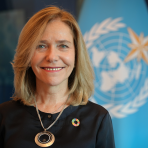Opening Remarks to the Cg-Ext (2025) Call to Action
Excellencies, distinguished delegates, colleagues, ladies and gentlemen,
Allow me to begin by expressing my deep appreciation to President Chapo, whom it is such an honour to have here among us. President, we are so grateful to have you, your words are an inspiration to us. Mozambique leadership is truly remarkable, widely investing in preparedness and response capacities, and advancing in creating an integrated Monitoring and early warning platform connecting meteorology, water resources management and disaster risk reduction all together.
Tambien quiero agradecer a Su Excelencia Sara Aagesen Muñoz, and to the many ministers and guests who have spoken this morning. Your words have underscored the shared determination that brings us together — a determination to protect our people, our economies, and our future. I am encouraged and inspired by the clarity of purpose and the commitment reflected in your interventions.
Early Warnings for All embodies our 75th anniversary slogan because it represents Science for Action and Science IN Action to protect every person on Earth from dangerous weather.
The Early Warnings for All in Focus report shows that, in less than three years, this initiative has evolved into a global movement for solidarity. It documents how governments, meteorological services and partners are turning ambition into action: by building capacity, modernizing infrastructure, and strengthening the forecasts and warnings that save lives.
But it also tells us that progress remains uneven. Far too many people remain exposed to floods, storms, drought and extreme heat. So today, as we celebrate what has been achieved, we must also face what remains to be done. This is both a moment of pride and a moment of resolve.
The world is facing more frequent and intense weather, water, and climate hazards. It is clear that early warnings work. Our challenge is to ensure that they work everywhere, for everyone and every time.
The progress we have seen proves that transformation is possible. But to reach every person on Earth by 2027, we must scale up implementation, investment, and coordination. NOW.
The report that WMO Deputy Secretary-General Ko Barrett just presented gives us cause for both optimism and urgency.
We are seeing progress: stronger observation networks, better forecasting tools, and wider access to warnings. New technologies are improving the lead times, accuracy and reliability of forecasts.
But the gaps remain stark. Many national meteorological and hydrological services still lack institutional frameworks and predictable funding. These are essential for them to operate as the authoritative voice for early warnings.
We must also close the digital divide, especially in Least Developed Countries and Small Island Developing States. Open, real-time exchange of weather, hydrological and climate information is the lifeblood of accurate warnings.
In short, the tools are improving, but the systems that sustain them are not yet strong enough.
This is where our collective effort must now focus: turning progress into long-term capability.
Science and technology are advancing. Partnerships are expanding. What we need now is alignment: national ownership supported by coordinated international action, and investment that meets the scale of the challenge. The next two years will decide whether the vision of Early Warnings for All becomes reality.
As Secretary-General of the World Meteorological Organization, I therefore call upon Members, international and regional organizations, development partners and the private sector to unite around our shared goal.
Let us act together to:
- Embed multi-hazard early warning systems in national strategies and budgets, supported by predictable financing.
- Empower National Meteorological and Hydrological Services through stronger institutional frameworks, updated legislation, and sustained resources.
- Coordinate international assistance so that financial, technical, and institutional support strengthen national capacity.
- Champion open and free data exchange as a global public good, ensuring all countries can both contribute to and benefit from shared information.
- Expand and modernize observing networks.
- Harness emerging technologies responsibly to enhance forecasting accuracy and speed.
- Scale up impact-based forecasting so people know what the weather will DO and can take early action.
- Engage the private sector as partners to co-design solutions, share innovation and data, and help extend early warning services to all.
Excellencies,
Early Warnings for All is not only a global initiative. It is a promise to deliver safety and resilience for every nation and every person.
The standards exist. The tools exist. The data flows.
What remains is the collective will to act with the speed and scale demanded by the rising frequency and intensity of hazards.
Let us turn vision into reality. I call upon all of you, I call upon Governments, the private sector, international and regional organizations, financial institutions and donors to unite, to commit, to move forward this agenda with urgency.
The time is now.
Thank you.
Statement by


